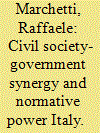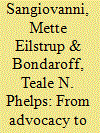| Srl | Item |
| 1 |
ID:
125903


|
|
|
|
|
| Publication |
2013.
|
| Summary/Abstract |
There is a need for a reassessment of the Italian contribution to international affairs. If a more comprehensive and pluralist reading of Italian action at the international level is developed, an image of normative power Italy may emerge. Italian input has been crucial in a number of transnational campaigns that have had significant impact at the international level. The cases of the peace in Mozambique, the International Criminal Court, the Moratorium on the Death Penalty and, more recently, the Ban on Female Genital Mutilation all illustrate Italy's contribution to international affairs, especially the politics of norm change. These cases are all characterised by the presence of intense civil society-government synergy. In order to advance the understanding of the processes and impact of transnational mobilisations, this analysis examines the domestic conditions that facilitated such synergy, intended as key conditions for the empowerment of transnational activism itself.
|
|
|
|
|
|
|
|
|
|
|
|
|
|
|
|
| 2 |
ID:
133651


|
|
|
|
|
| Publication |
2014.
|
| Summary/Abstract |
We analyze forms of environmental activism that eschew the "information and socialization" politics typically associated with Transnational Advocacy Groups (TAGs) and instead favor direct, confrontational strategies, whose aim is to enforce international law. While mainstream TAGs typically seek influence through norm entrepreneurship, lobbying or "naming and shaming", what we label Direct Enforcement (DE) intervenes directly to halt (purportedly) illegal practices by states and private actors. DE activism has been most visible in transnational campaigns to protect endangered marine species, where environmental groups have resorted to damaging equipment used for illegal fishing and boarding fishing boats to enforce maritime conservation law. Often branded as eco-terrorism, such confrontational strategies have been largely ignored by scholarly literature on transnational activism. We contend that DE merits closer attention by IR-scholars for two reasons. First, DE activism plays an important role in enhancing the compliance pull of international laws in an area-the global environment-where states often lack capacity and political will to enforce international agreements. Second, an analysis of DE-activism provides important insights about issue selection and relative campaign success under different structural circumstances, thereby expanding our understanding of transnational advocacy more generally.
|
|
|
|
|
|
|
|
|
|
|
|
|
|
|
|